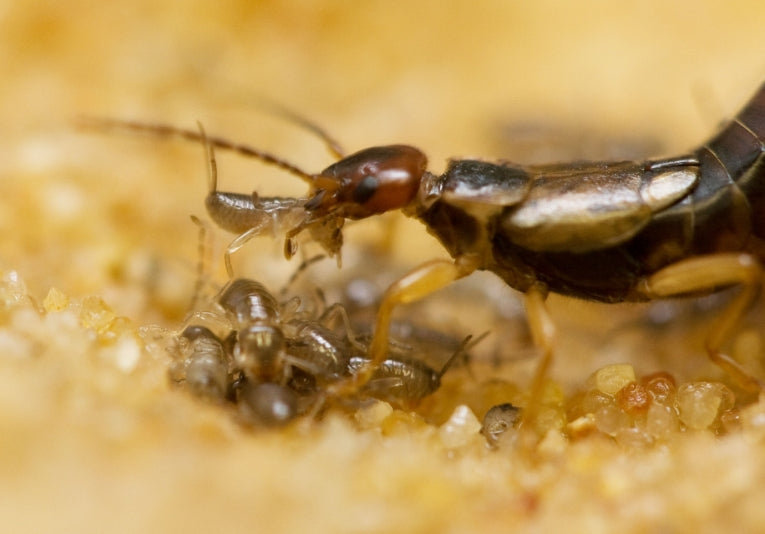Parental care is one of the great evolutionary advances, improving offspring survival while potentially lowering that of the parent. The idea now seems antiquated in that poor conditions in the environment have been shown to lower survival rates. The family members in an earwig "aggregation" can compete among themselves and achieve less growth than the offspring would have had if left to their own devices.
Earwig nymphs of Forficula auricularia, the European earwig, can survive without parents quite normally. Obviously the Italian mother syndrome hasn't evolved in earwigs. Joel Meunier and Mathias Kolliker have investigated here whether a second generation is affected by poor food supply in a first earwig generation of the year. They publish today in the Royal Society journal Biology Letters.
The experiments consisted of 132 nymphal groups of differing size, some with mothers who were mated once and some with females that had been allowed to have four partners. The large groups were of 20 individuals while the small groups consisted of 10. Earwigs live for roughly 16 days as an aggregation, so this period became the experimental time zone. Mothers' weights were taken to check on whether they had second clutches ready for birth.
Food restriction was achieved by providing a diet every 6 days and removing excess after 3 days (although it normally took only 2 days to be eaten.) The critical survival rate was estimated by subtracting the rate for non-mothered nymphs from the rate for mothered nymphs, producing the BMP ("benefit of maternal presence") number!

This is one of the groups of twenty nymphs from the earwig maternity wing; Credit: Joel Meunier
The significance of the result was outstanding. Up until day 16 (the end of the first stage-nymph), nymphs survived with or without mothers equally well. At day 16, however, the large and mothered groups were less successful. The BMP was negatively correlated with female weight gain until day 16. BMP also failed to predict the number of second generation eggs.
You would expect a 15% increase in survival rate with mothers under normal conditions and yet here we have a 43% reduction Parents often reduce the number of offspring to improve survivors' - and invest their energy in second broods to compensate. Neither theory was supported here. However 20% of the females were "good mothers." Their offspring managed to enhance their nymphs' survival despite the lack of food. Cannibalism was a way of enhancing your chances as an earwig nymph, but this tended to happen only when mother wasn't in the Petri dish!
The siblicide (sibling cannibalism) rate was low and wasn't in any way preferential between the nymphs. They didn't seem to recognise any genetic connection. The competition for resources seems to have been between the mother and her offspring. This is a very early stage in the evolution of parental care and poor conditions obviously produced the negative effects. Personally, the "good mothers" possibly have some interest for researchers. It is pure supposition but still possible that genetic or other factors created their success. Later in evolution, we know that parental care works out. But the devious methods by which it has diversified and, in this case, become a negative agent is fascinating.










